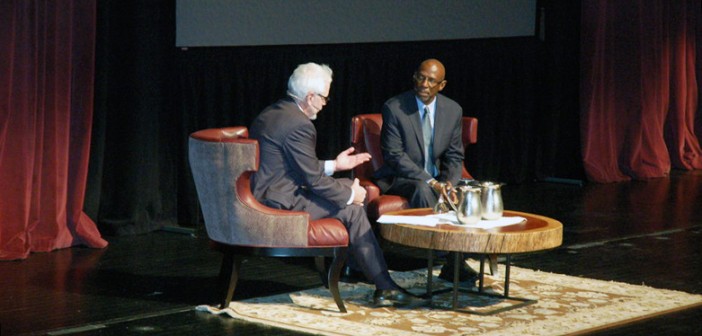In recent years, the debate between charter and public schools has become an increasingly prevalent issue in the national sphere. The education reform movement was brought to center stage at Lehigh by Geoffrey Canada last Tuesday.
Canada, former president and chief executive officer of the Harlem Children’s Zone and activist for school reform, spoke about “The Promise of Charter Schools,” as a companion segment to the charter school debate that began last year as part of Lehigh’s College of Education distinguished lecture series.
The Distinguished Lecture Series features prominent speakers from various different areas of expertise. By hosting experts renowned for their activism and differing points of view, Lehigh hopes to offer a forum for finding solutions to society’s current salient issues.
Canada prefaced his talk by describing the childhood that he and millions of others have experienced, one that is unimaginable to many Lehigh students: a childhood of fear, poverty and little opportunity. The schools that he grew up in did nothing to accurately test students’ intelligence, nor did they seek potential within student –social mobility within the schools was almost nonexistent. Once placed in a certain class level, it was difficult for anyone to move up. Rather than focus on learning spelling or math like the rest of the students, Canada said, those living in poverty have to focus on simply surviving the dangerous streets every day.
“I do not pretend that this thing is fair for poor kids,” Canada said. “I’ve spent my entire life figuring out what we need to do for those kids, for those kids to make it.”
This divide between the rich and the poor drove Canada to enter the world of education.
Despite pressure to become a doctor from mentors and peers who saw his high grades in school, Canada said always knew that he wanted to become a teacher. And not just for a certain level of learning – Canada felt it was important to work with children from birth through adolescence and into early adulthood. His reasoning was that there is no single most important time in a person’s life. Learning occurs throughout the developing years, and abandoning a child at any point in his or her learning career can be damaging to their future.
According to Canada, this is also why richer families — having the money and time to do so — almost always educate their children through college, while impoverished families may not even think about sending their children to college.
“In poor communities, failure is an option,” Canada said.
Canada’s discussion is the opposing complement to an earlier school reform talk held last February, when Lehigh invited public school advocate Diane Ravitch to speak about the dangers of privatizing schools. Upholding the purpose of the distinguished lecture series, these differing views on the school systems debate provide a comprehensive view of the this argument.
“What we’ve tried to do in the last few years is to bring on our stage people from both sides of that political divide and both sides of that argument to see if we can’t help to find common ground,” said Gary Sasso, dean of the College of Education. “What needs to happen is we need to look at what’s best for kids rather than who wins an argument regarding charters or publics.”






Comment policy
Comments posted to The Brown and White website are reviewed by a moderator before being approved. Incendiary speech or harassing language, including comments targeted at individuals, may be deemed unacceptable and not published. Spam and other soliciting will also be declined.
The Brown and White also reserves the right to not publish entirely anonymous comments.
1 Comment
Would have been an interesting debate if Canada and Ravitch convened at the same forum. The back and forth could have proved productive.